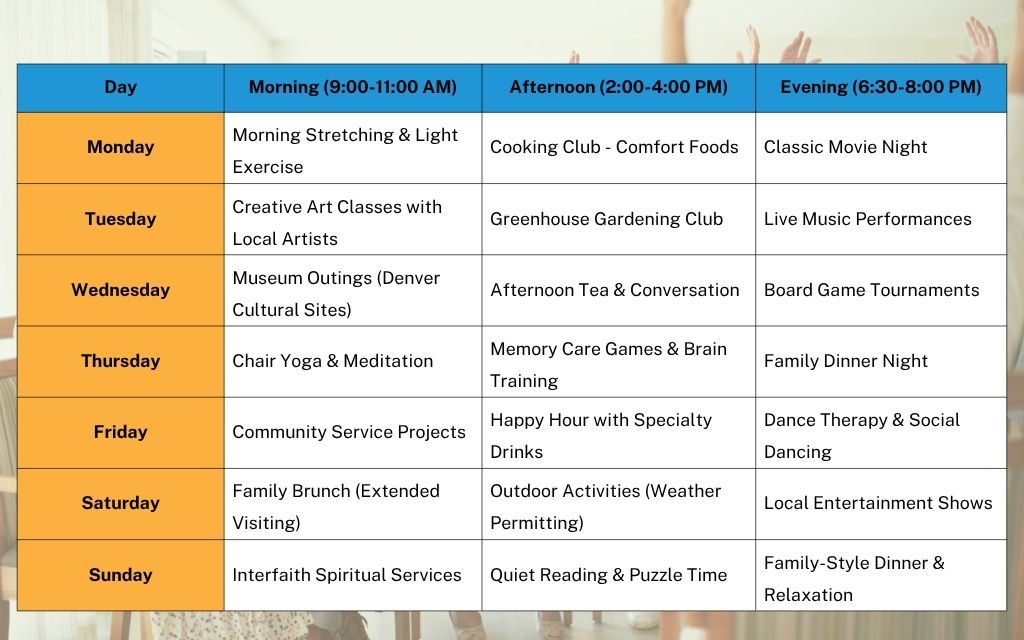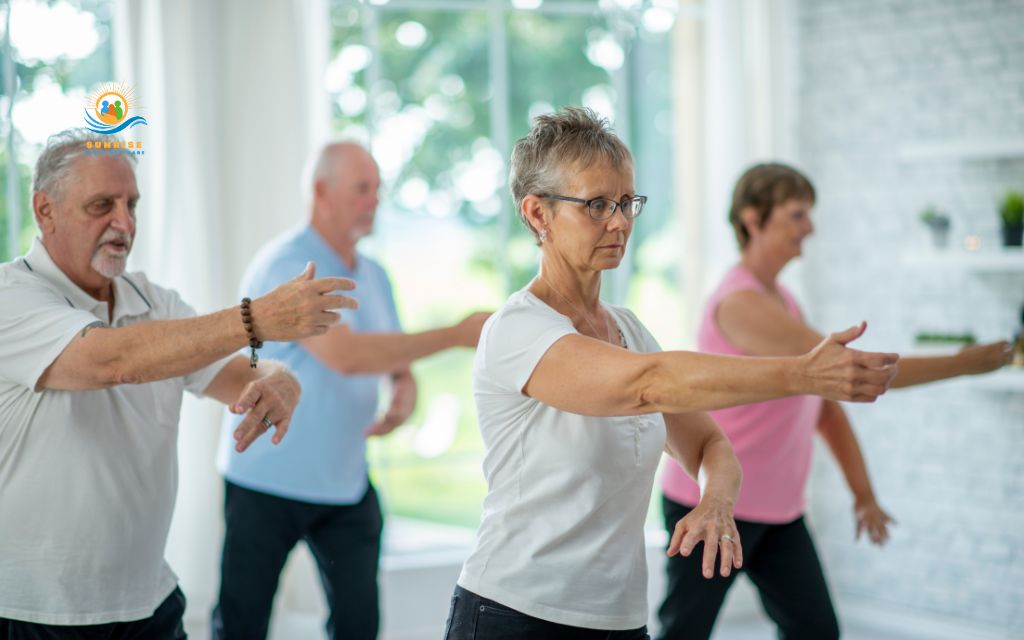Choosing an assisted living community for your loved one involves far more than evaluating medical care and safety protocols. The daily rhythm of life captured in an assisted living activity calendar reveals the heart and soul of any community.
These carefully crafted schedules show how residents spend their precious hours, from morning exercise sessions to evening entertainment, offering families a window into what makes each day meaningful and fulfilling. Understanding these calendars empowers you to make informed decisions about where your family member will call home.
Why activity calendars matter in assisted living
The heart of resident engagement
A well-designed assisted living activity calendar provides structure, purpose, and social connection that combats isolation and depression among seniors. These calendars transform routine days into meaningful experiences, giving residents something to anticipate and enjoy. When seniors have regular activities to look forward to, they maintain better mental health and overall life satisfaction.
Mental and emotional benefits
Senior living activity calendars include cognitive activities like puzzles, book discussions, and educational programs that help maintain mental sharpness.
Regular mental stimulation through structured activities can help slow cognitive decline and boost confidence. Creative activities like art therapy and music sessions provide emotional outlets and stress relief, contributing to better psychological well-being.
Physical and social benefits
Physical activities in assisted living activities calendars include gentle exercise classes, walking groups, and gardening that help maintain mobility and strength. These programs are designed for various ability levels, ensuring all residents can participate safely.
Group activities naturally foster friendships and community connections, reducing loneliness and creating support networks among residents.

What’s inside a typical assisted living activity calendar
Types of activities
Nursing home activity calendars and assisted living schedules share common categories while differing in intensity and support levels.
Cognitive activities
Cognitive activities include puzzle competitions, trivia contests focusing on different decades, computer classes for staying connected with family, and educational seminars on health and wellness topics relevant to seniors.
Physical activities
Physical activities adapt to varying mobility levels. Water aerobics in heated pools provide low-impact exercise, while balance training classes help prevent falls – a critical concern for older adults.
Outdoor adventures might include visits to local farmers markets, botanical garden tours, or simple nature walks through facility grounds designed with senior accessibility in mind.
Creative programming
Creative programming taps into artistic expression through painting classes, pottery workshops, creative writing groups, and music appreciation sessions. Many residents discover new talents or rediscover forgotten passions through these structured creative opportunities.
Spiritual and reflective activities
Spiritual and reflective activities honor diverse backgrounds through meditation sessions, interfaith services, gratitude journaling, and quiet contemplation spaces. These programs address the emotional and spiritual needs that become increasingly important as people age.
Example weekly schedule
A comprehensive assisted living activities calendar balances structure with flexibility, offering multiple daily options while maintaining predictable routines that provide comfort and security.

The anatomy of an excellent activity calendar
Resident-centered planning
Outstanding senior living activities calendars emerge from genuine resident input rather than generic programming templates. Quality communities conduct regular surveys, hold resident council meetings, and maintain suggestion boxes to understand changing interests and preferences. Activities directors spend time with individual residents, learning about their backgrounds, hobbies, and unfulfilled interests.
Variety and inclusion
Exceptional activity calendar assisted living programming ensures every personality type and ability level finds meaningful engagement.
- Introverted residents might prefer small book clubs or individual art projects, while extroverts gravitate toward group games and social events.
- High-energy individuals enjoy dancing and competitive activities, while those preferring gentler engagement appreciate meditation groups and craft projects.
- Inclusion extends beyond personality differences to accommodate physical limitations, cognitive changes, and cultural backgrounds.
Activities are adapted for wheelchair users, provide memory support for residents with dementia, and honor diverse cultural traditions through holiday celebrations, cuisine, and music from various backgrounds.
Qualified activity staff
The difference between mediocre and outstanding programming often lies in staff qualifications and passion. Certified Therapeutic Recreation Specialists (CTRS) bring professional training in adapting activities for older adults with various health conditions.
These professionals understand how to modify popular games for cognitive limitations, adapt physical activities for mobility challenges, and create inclusive environments where everyone can participate meaningfully.
Quality Denver facilities invest in ongoing staff education, sending activities coordinators to conferences, workshops, and certification programs. This commitment to professional development translates into creative, safe, and engaging programming that evolves with best practices in senior care.

Community integration
Denver’s rich cultural landscape provides exceptional opportunities for assisted living calendars of activities that connect residents with the broader community.
Partnerships with local organizations create unique experiences unavailable in other cities. The Colorado Symphony offers special senior concerts, while the Denver Public Library provides outreach services bringing books and programs directly to communities.
Local restaurants cater special dinners, showcasing Denver’s culinary scene within assisted living dining rooms. Art galleries arrange private tours accommodating wheelchairs and walkers.
These partnerships ensure residents maintain connections to the Denver community they’ve called home for decades.
Family engagement opportunities
Monthly family nights, holiday celebrations, and special events create meaningful intergenerational connections. Some communities host grandparent-grandchild craft days, family game tournaments, or shared cooking experiences.
Open invitation policies for meals, entertainment, and outings help families stay connected to their loved one’s daily experience.
When families participate in activities, they gain firsthand insight into care quality and their relative’s happiness and engagement levels.
Evaluating activity calendars during your search
When touring Denver assisted living communities, examine their activity schedule calendar with these critical questions:
- Does the programming reflect residents’ actual interests, or does it seem generic and institutional?
- Are activities adapted for different ability levels, ensuring everyone can participate meaningfully?
- Do you observe genuine enthusiasm from both residents and staff during activities?
Pay attention to resident participation rates during your visit. High-quality programs maintain engagement levels above 70%, with residents actively involved rather than passively observing.
Notice whether activities accommodate different physical abilities and cognitive levels, creating inclusive environments where everyone feels valued.
Ask about staff qualifications, programming budgets, and how often calendars change to reflect seasonal interests or resident feedback.
Communities investing significantly in activities typically have dedicated budgets, qualified staff, and flexible programming that evolves with resident needs.

Conclusion
An assisted living activity calendar serves as far more than a simple schedule – it represents a community’s commitment to treating residents as whole people deserving joy, purpose, and connection.
When researching Denver facilities for your loved one, remember that the quality of daily programming directly impacts overall happiness and well-being. Take time during facility tours to observe activities in progress, speak with current residents about their experiences, and envision your family member participating in the programming offered.
Ask yourself: “Would Mom enjoy Tuesday morning art class?” or “Would Dad find meaning in Thursday’s veterans’ discussion group?”
The right community will offer assisted living activities calendar programming that honors your loved one’s personality, interests, and abilities while introducing new experiences that enhance their golden years.
Ready to explore Denver assisted living communities that prioritize meaningful daily engagement? Contact Sunrise Seniors Daycare today to discover where your loved one can truly thrive through purposeful, joyful programming designed with their happiness in mind.
Frequently asked questions (FAQs)
How often do Denver assisted living facilities update their calendars?
Most facilities create new calendars each month with weekly updates for any changes. Residents and families typically receive monthly schedules in advance, with daily reminders posted on community boards and announced during meals.
Can families join in activities?
Yes, most Denver assisted living communities welcome family participation in activities like holiday celebrations, meals, and entertainment events. Some facilities have specific family activity days each month, while others allow families to join most regular programming with advance notice.
Who creates the activity calendar?
The activities director or recreation coordinator creates the calendar, often working with nursing staff and getting input from residents about their interests. Some communities have resident committees that help suggest activities and provide feedback on programming.
Are independent living and assisted living calendars different?
Yes, there are differences. Independent living activity calendars focus more on outings, educational trips, and self-directed activities. Assisted living calendars provide more structured, supervised activities with additional support for residents who need help participating.
Do nursing homes and assisted living communities offer similar activities?
Both offer structured activities, but nursing home activity calendars typically include more therapeutic and rehabilitation-focused programming. Assisted living communities generally offer more recreational and social activities, though both aim to keep residents engaged and active within their abilities.
What if a resident doesn’t want to participate in activities?
Participation is always voluntary. Good facilities offer quiet spaces and individual activities for residents who prefer less social engagement, while gently encouraging participation without pressure.




